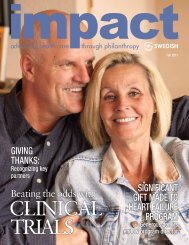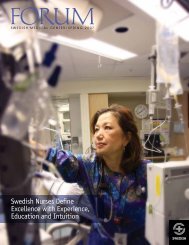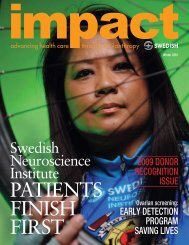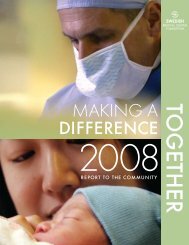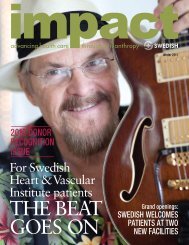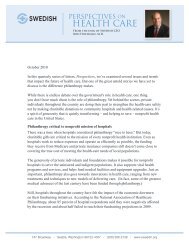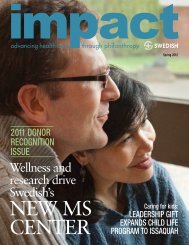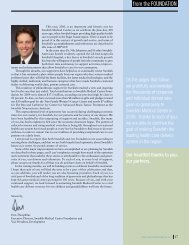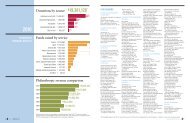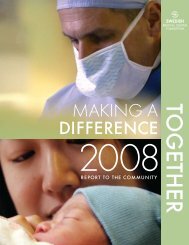TAKING ROOT - Swedish Medical Center Foundation
TAKING ROOT - Swedish Medical Center Foundation
TAKING ROOT - Swedish Medical Center Foundation
Create successful ePaper yourself
Turn your PDF publications into a flip-book with our unique Google optimized e-Paper software.
GLOBAL<br />
HEALTH<br />
CARE<br />
STRATEGIES AT HOME<br />
Sometimes epidemic, communitywide<br />
problems, such as infant mortality and diabetes, call<br />
for concerted grass-roots action. There is perhaps no better place<br />
to take advantage of local resources to support this kind of<br />
community action than the Puget Sound region, a leading<br />
international center for global-health activities with many nonprofits<br />
that address medical disparities in developing nations.<br />
In 2008, the idea of using the expertise of these global<br />
organizations to address local health issues arose in a conversation<br />
between <strong>Swedish</strong> president and CEO, Rod Hochman,<br />
M.D. and Dan Dixon, <strong>Swedish</strong>’s vice president of external affairs.<br />
Their talk led to a dinner to which they invited nearly a dozen<br />
global-health leaders from local organizations including<br />
PATH, the University of Washington and the Fred Hutchinson<br />
Cancer Research <strong>Center</strong>. The result was the Global to Local<br />
Initiative.<br />
“At the dinner, we sat around a big table and had a discussion<br />
about taking some of the practices we’ve learned are<br />
successful in developing nations and bringing them home to<br />
make an impact on underserved<br />
communities,” says Dixon. “As we<br />
talked, it was like a cartoon on TV…<br />
you could see light bulbs going off<br />
over the heads of folks. They were<br />
quite enthusiastic.”<br />
In the ensuing three years,<br />
<strong>Swedish</strong> has collaborated with local<br />
partner organizations who share<br />
<strong>Swedish</strong>’s interest in finding ways to<br />
Dan Dixon, <strong>Swedish</strong>’s vice<br />
president of external affairs.<br />
improve local health to develop the initiative. These organizations<br />
are the Washington Global Health Alliance, whose<br />
membership includes numerous leading global-health nonprofits<br />
such as the Bill and Melinda Gates <strong>Foundation</strong> and<br />
PATH; Seattle & King County Public Health; and HealthPoint,<br />
a local community health organization that operates primary<br />
care and dental clinics for low-income patients. <strong>Swedish</strong> has<br />
also made a significant financial commitment, pledging<br />
$1 million in funding to the initiative.<br />
“Collaboration with our community partners is absolutely<br />
crucial for an initiative such as Global to Local,” says Jay Fathi,<br />
M.D., medical director for Community Health and Care Delivery<br />
Innovation at <strong>Swedish</strong>. “We have some very poor health outcomes<br />
right here in our own backyard. We’ve all got to work<br />
together to create sustainable systems to promote improved<br />
overall health and well-being in our local communities.”<br />
SeaTac and Tukwila, two King County communities to the<br />
south of Seattle, were identified as pilot cities for the program.<br />
Both have considerable poverty, a broad mix of ethnic and<br />
recently immigrated minority populations, and a number of<br />
serious health problems and chronic illnesses that are also<br />
linked to specific populations and groups.<br />
Once these communities were identified, initiative leaders<br />
began working with local individuals and community leaders,<br />
representing a broad range of populations, to develop appropriate<br />
program activities. “The primary goal of the planning<br />
process has been to reach consensus on a workable and<br />
achievable program of health-improvement and economicdevelopment<br />
strategies that are innovative, holistic, costeffective,<br />
community-driven and highly attentive to the cultural,<br />
structural and economic realities of both the larger community<br />
and the diverse groups living in the SeaTac/Tukwila areas,”<br />
says Dixon.<br />
This spring, the first of the initiative’s programs were<br />
launched in the two cities. They include:<br />
– Implementation of community health workers, who<br />
counsel residents in the community to increase understanding<br />
of health issues and to promote healthier behaviors at a grass-<br />
roots level. Their initial focus in SeaTac and Tukwila will be<br />
on reducing diabetes and related conditions by encouraging<br />
residents to make lifestyle changes and take advantage of<br />
local health clinics and community resources.<br />
– Introduction of an innovative interpreter service,<br />
including a call center featuring video-conferencing, with<br />
interpreters for the top 10 languages in the region.<br />
– Launching a partnership with T-Mobile, who is contributing<br />
1,000 phones to 1,000 families. The phones will be<br />
loaded with an application that connects them to an interpreting<br />
call center, as well as several mobile-health applications.<br />
– Creation of “conversation cafés”— places where community<br />
members can engage in health-improvement discussions<br />
and activities in a comfortable, non-clinical environment.<br />
Cafés throughout the two communities, offering free food and<br />
refreshments, will help build community engagement around<br />
priority health issues. “We’ll begin the education process there,<br />
using our community health providers as a way to reach out to<br />
folks,” says Dixon. Community leaders, nonprofits and faith<br />
organizations are helping to get the initiative’s word out.<br />
Other programs are expected to include: partnerships with<br />
the two cities to link health programs with economic-development<br />
activities; mobilizing community-based organizations to teach<br />
and assist residents to make healthier food choices for their<br />
families; and generating education campaigns around priority<br />
health issues.<br />
“We’re at a point in health care now where the old model<br />
simply can no longer sustain itself,” says Dixon. “The Global<br />
to Local Initiative is exciting because not only does it combine<br />
the remarkable innovations we’ve taken to developing<br />
nations and apply them at home, it also combines the experience,<br />
resources and community goodwill of the participating<br />
organizations in a way that’s never been attempted before. It’s<br />
our hope that the initiative serves as a model across the nation<br />
in furthering community health.”<br />
Make an impact: <strong>Swedish</strong> is committed to providing our<br />
patients the highest quality care available. Through ongoing partnerships, development,<br />
and community-based programs, following are just a few examples of how <strong>Swedish</strong> is<br />
caring for our community and beyond.<br />
Redmond/Mill Creek Ambulatory Care <strong>Center</strong>s: Patterned after the highly successful<br />
Issaquah campus model, the Redmond and Mill Creek campuses feature<br />
freestanding emergency departments with on-site lab services, advanced diagnostic<br />
medical imaging centers, primary- and specialty-care services, and full access to<br />
EPIC, <strong>Swedish</strong>’s secure electronic health records system, so vital information can be<br />
conveyed easily among a patient’s authorized caregivers.<br />
Mobile Mammography Program: The Mobile Mammography Program is dedicated<br />
to bringing high-quality mammography services to women throughout Western<br />
Washington, primarily in underserved and hard-to-reach areas. The program includes<br />
two Breast Care Express coaches, funded by philanthropy, which deliver experienced<br />
technologists and mammography equipment to locations convenient for women. For<br />
many, the Breast Care Express is their only opportunity to access routine mammograms.<br />
The program’s goals are to make screening more convenient, increase outreach<br />
to underserved communities and reduce the disparities in care due to access.<br />
<strong>Swedish</strong>/Edmonds campus: Since the merger of <strong>Swedish</strong> <strong>Medical</strong> <strong>Center</strong> with Stevens<br />
Hospital in 2010, North Seattle and Snohomish county residents are benefitting from a<br />
partnership that offers increased local services, including plans for an enhanced cancer<br />
care program, while enabling greater access to the latest medical treatments and<br />
comprehensive services of the <strong>Swedish</strong> system.<br />
Look for an update on plans for our Edmonds campus in the next issue of IMPACT.<br />
10 IMPACT SUMMER 2011 www.swedishfoundation.org 11 9<br />
FEATURE



